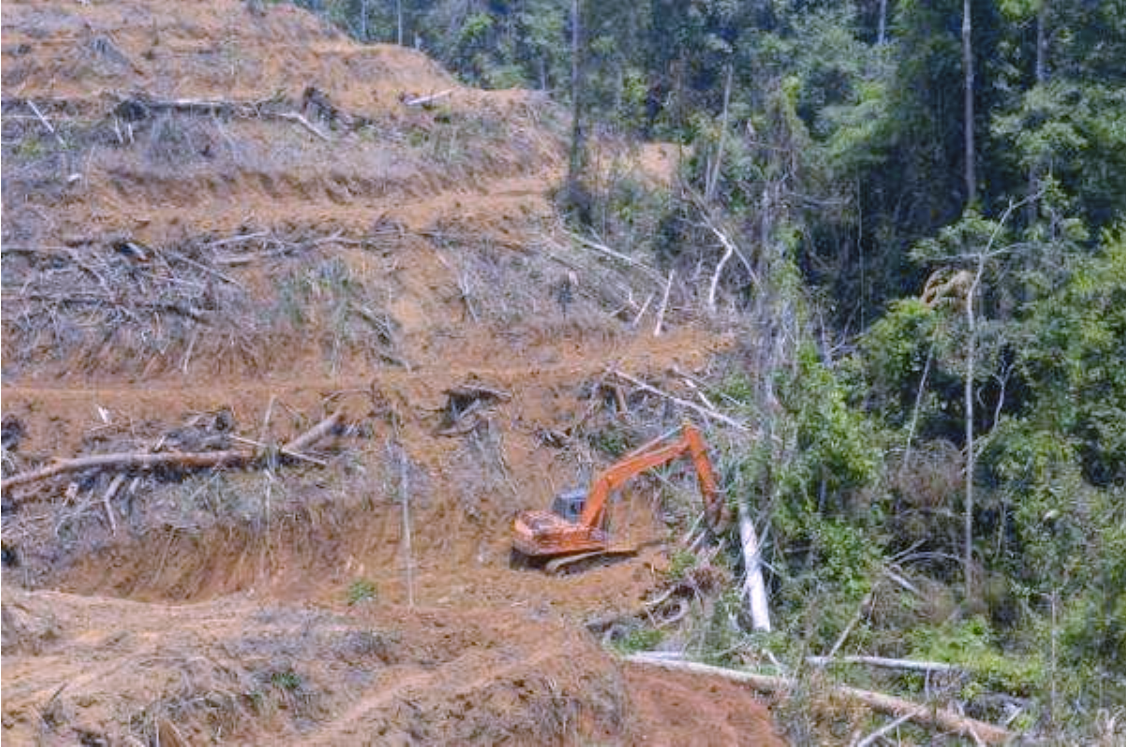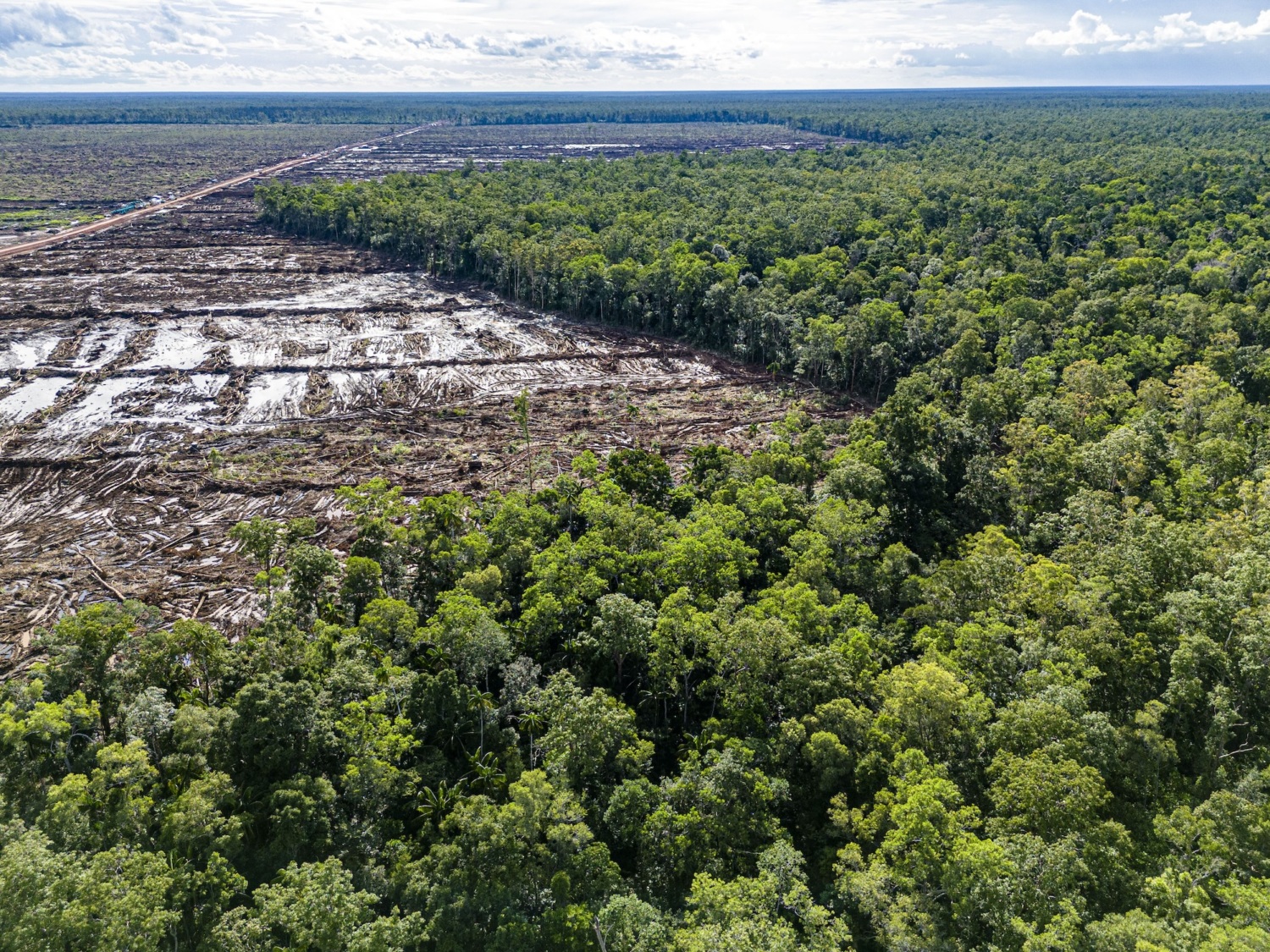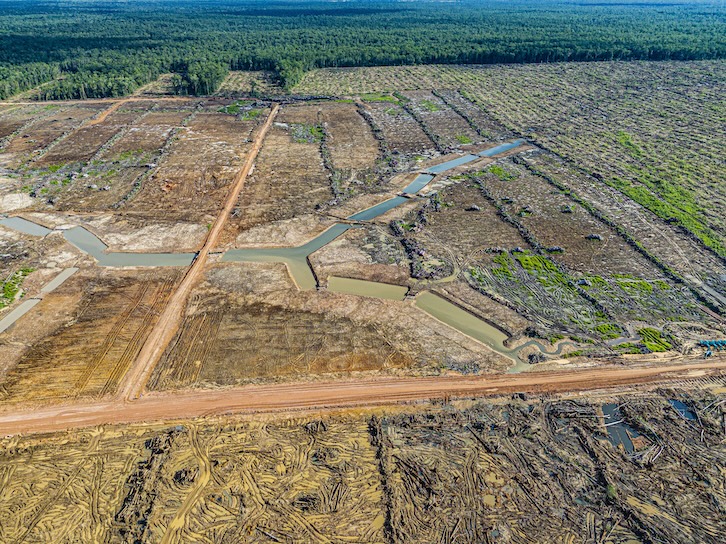
New investigation alleges deforestation and greenwashing linked to Michelin.
Nov 15, 2022
A major new year-and-a-half long investigation by Voxeurop into a “sustainable” rubber project by French tire giant Michelin and Indonesian conglomerate Barito Pacific has led to fresh allegations of widespread deforestation, wildlife habitat destruction, and greenwashing linked to the joint venture.
The investigation, initially sparked by Mighty Earth’s 2020 Complicit report, alleges investors in a $95 million so-called “green bond” used to finance the PT Royal Lestari Utama (RLU) project in Jambi, Sumatra, were misled and never told that Michelin’s local partner had deforested thousands of hectares of tropical rainforest and global priority wildlife habitats just prior to the launch of the flagship project in January 2015.
Michelin had claimed to investors that the RLU project would promote good practices for sustainable natural rubber production and support the development of local communities while protecting, reforesting, and restoring crucial habitats for the critically endangered Sumatran tigers, elephants, and orangutans, which live in and around RLU’s rubber plantations.
Specifically, Michelin said in a key press statement in May 2015 that their RLU project with Barito Pacific would include: “The reforestation of three concessions, representing a total surface area of 88,000 hectares, ravaged by uncontrolled deforestation.” But analysis of historical satellite imagery published in the Voxeurop report found much of the landscape within RLU’s concessions in Jambi was not previously “ravaged by uncontrolled deforestation” at all.
Instead, Voxeurop’s investigation claims that 8,468 hectares of pristine rainforests within the concession were industrially deforested to make way for RLU’s monoculture rubber plantations and that, in doing so, vital habitats in Sumatra’s No.1 conservation priority area – including key tiger ranges, elephant corridors, and orangutan re-introduction sites – were destroyed and fragmented. Two highly vulnerable forest-dwelling Indigenous communities also lost their ancestral lands, and other villagers and local communities have claimed they did not give their free, prior and informed consent for these forest clearances.
Overall, Voxeurop found about a third of the rubber plantations financed by the green bonds are located in the area that was deforested in Jambi before the joint venture with Michelin and Barito Pacific was signed.
The RLU project was supported by major organisations such as the UN Environment Programme (UNEP), USAID, and WWF and backed by key banks and financiers such as BNP Paribas, ADM Capital and the &Green fund. But the investigation published by Voxeurop asserts that Michelin and the Tropical Landscapes Finance Facility (TLFF), which issued the 15-year $95m green bond, knew from an independent assessment report by Earthworm that Michelin’s local partner, Barito Pacific, had intentionally deforested the Jambi rainforests between 2011 and 2014. According to Voxeurop and an earlier complaint by Mighty Earth, this information was not shared with investors during the sale of $95m of green bonds on the Singapore Exchange in 2018 to finance the RLU project – a financial innovation dubbed as “Asia’s first green bond”, and which seemingly complied with Climate Bonds Initiative standards.
In June 2022, Michelin acquired RLU as a sole shareholder. In an extraordinary twist, that following month, the entire $95m in long-dated green bonds were quietly redeemed and paid back in full to investors for reasons which remain unclear.
Following the publication of the new evidence by Voxeurop, Mighty Earth Senior Director, Alex Wijeratna, said:
“This is a major scandal and a classic example of how green bonds are fuelling corporate greenwashing.”
“Two years ago, Mighty Earth produced evidence which suggested that Michelin knew its local partner had carried out extensive deforestation in Sumatra’s number one priority conservation area prior to the official launch of their joint venture. Voxeurop’s new investigation adds weight to our assertion that Michelin and other key actors failed to disclose material information about that critical habitat destruction to investors in this collapsed green bond scheme.”
“Local communities claim they were allegedly forced off their ancestral land in Jambi without free, prior and informed consent, while global priority habitats of critically endangered species were destroyed, bringing people and wildlife into conflict. Mighty Earth is joining local groups in Indonesia calling for an urgent UN investigation into alleged Indigenous, environmental, and human rights violations linked to Michelin’s RLU rubber project in Sumatra.”
With the publication of Voxeurop’s new investigation, there is now considerable evidence demonstrating that the RLU project in Jambi was in likely violation of the voluntary Green and Sustainability Bond Principles. Mighty Earth submitted a formal complaint to the green bond oversight body, the Climate Bonds Initiative (CBI) in London in March 2021 against the $95m green bond listing on the RLU project, but the CBI failed to formally respond to or investigate Mighty Earth’s complaint. With moves to tackle corporate greenwashing hitting the headlines at COP27, and the UN demanding a tightening of these voluntary standards, this case exemplifies all that is wrong with so-called “green” bonds.
Dr Julian Oram, Senior Director at Mighty Earth, is calling for proper scrutiny of green and sustainability-linked bonds to prevent greenwashing:
“Voxeurop’s evidence has exposed grave flaws in the booming but wildly unregulated green bond market. It has revealed how Southeast Asia’s first corporate green bond was glaringly unfit for purpose and facilitated greenwashing of a project with patently unsustainable origins.”
“With proper human rights-based due diligence and close stakeholder consultation, green finance schemes can play an important role in leveraging vital funds into nature-enhancing agriculture projects. But we need tougher regulation and scrutiny of green, climate and sustainability-linked bonds to ensure these schemes don’t mislead investors or inadvertently fuel climate change or forest and wildlife habitat destruction.”
Abdullah Bedoel, Executive Director of local environmental group Walhi Jambi, said human-wildlife conflict has become a bigger problem following the RLU project:
“The local community in Jambi have lost most of their ancestral forests due to massive land clearing for Michelin’s RLU project. In the past, the community could use the forests as a source of livelihood and grow crops. Now the animals that used to live there have lost their habitat, and the area has been opened to wildlife hunters. The food chain is badly disrupted, causing wildlife such as tigers and elephants to descend on community settlements in search of food. In the past, before the large-scale forest clearing, there were no cases of wildlife attacks on local communities. Now, communities around the forest must deal with elephant herds entering their farmlands and tigers preying on their livestock, even resulting in fatalities.”
Mighty Earth is calling for:
- An urgent UN investigation into alleged Indigenous, environmental and human rights violations in the RLU project area in Jambi, specifically those relating to the violation of Indigenous peoples’ rights;
- The publication of all environmental and social assessments, wildlife surveys, FPIC and community consultation exercises conducted before the launch of the joint venture between Michelin and Barito Pacific;
- Restoration of environmental damage done and full compensation for all negatively affected communities.
- Tighter regulation of green bond markets to stop the mis-selling of financial products linked to “sustainable” rubber and other commodity projects without adequate due diligence checks.
- A formal response to a written complaint submitted by Mighty Earth in March 2021 to the Climate Bonds Initiative, which played a crucial role in rubber-stamping the “green” credentials of the RLU project.


